Water filters for a well: features of the choice and
Do we need water filters from the well or not? What filtration systems to choose for everyday use? What are the features of operation of this equipment? The answers to these and similar questions will be considered in this article.
There is a popular belief that the water obtained from a well is crystal clear and can immediately be used in food without any treatment. In fact, this is a common misconception, because regardless of the depth from which water is produced, its condition is far from ideal.
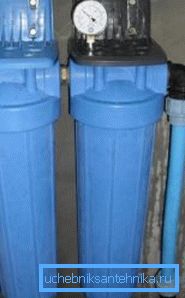
Under the layer of soil, where the aquifer is located, a large amount of suspended solids minerals and other substances are dissolved, whose content in drinking water is at least undesirable, but at the maximum unacceptable.
Despite the fact that the composition of the artesian water varies greatly in accordance with the region in which the intake was made, water filtration from the well is necessary.
Features of water purification using filters
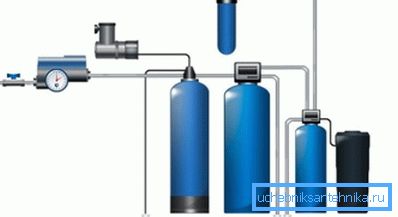
The water purification from the well implies not only the separation of minerals which impart rigidity, but also the neutralization of impurities and surplus substances, the content of which in certain quantities is allowed.
For example, if the water from the well smells of hydrogen sulfide after the filter, then the composition of the aqueous medium is first analyzed and it is found out how to solve the problem. To do this, a test is taken from the well, which is subsequently analyzed in laboratory conditions. Of course, the price of water with this approach to its production will increase slightly, but these costs are completely true.
The correct composition of water has a positive effect on human well-being and on the operational status of a number of household appliances, including washing machines and dishwashers, heating boilers, running water heaters, storage boilers, etc. In addition, the high salinity of water without proper purification will adversely affect the operational resource of the autonomous water supply system.
Types of filtration equipment
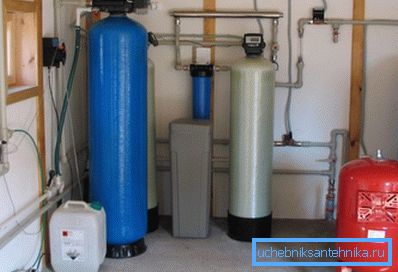
According to the results of the water analysis, a water treatment system is compiled. The system may include various water filters for wells, thus providing an integrated approach to cleaning.
At arrangement of modern wells, the following types of filters are applied:
- mesh rod tubular;
- slotted and perforated;
- wire;
- gravel
Consider the features of the application of each of these varieties.
- Water strainer for wells has found wide application in areas with unstable rocks with a predominance of sandy-clay deposits. Such equipment is manufactured taking into account various configurations.
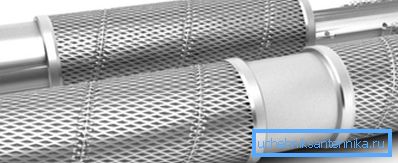
The choice of this form is not accidental. For example, devices of complex shape are used for wells drilled in rock of fine and medium grain size. Devices with a multilayer configuration and with square cells are the optimal solution for rocks with a high content of gravel sand.
Important: In the grid used cells with a size of 0.12-3 mm?. Mesh filters are made using stainless steel. Thanks to this solution, a long service life is ensured.
Benefits:
- affordable price;
- durability;
- corrosion resistance;
- easy removal of the device from the well for maintenance and repair.
Disadvantages:
- low well productivity;
- when operating in carbonate and ferruterous waters, premature blockage of the grid cells is possible.
- Slotted and perforated filters are a category of equipment used in artesian wells drilled in high gravel, crushed stone and pebble soil. The working part of the filter is capable of retaining large solid particles with a size of up to 10 mm and sand with a fraction of up to 2 mm.
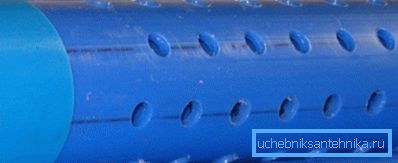
The cleaning process takes place in a perforated tube with many small holes. The simplicity of the system is due to the fact that deep-well cleaning is not necessary for artesian water.
Important: The flow rate of wells equipped with a slotted filter is high. Therefore, such filters should be equipped with stiffness belts that can withstand increased mechanical loads on the perforated parts of the structure.
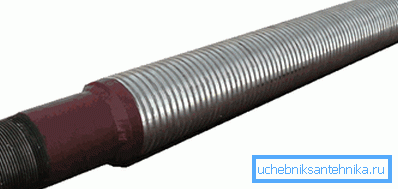
The main difference between slotted filters and perforated counterparts is high throughput with identical water treatment efficiency. The area of the slots on the core frame is several dozen times larger than the area of the holes on the perforated surface of the filter element.
Benefits:
- a wide range of models and, as a result, the possibility of choosing the best option;
- ease of maintenance and repair;
- wide range of diameters for almost any well.
Disadvantages:
- high probability of plugging holes with fine sand;
- the possibility of the destruction of the grid due to the interaction of metal and aggressive environment
- reduction in water production due to clogging of the filtering surface.
- Wire filters are used in both sandy and artesian wells. The device consists of a perforated base, frame and settling tank for screening.
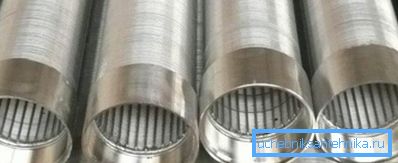
The design looks like a pipe section with slots and holes 10–20 mm wide. The wire filter prevents the penetration of impurities and suspended particles at the approaches to the well.
Benefits:
- durability and reliability;
- high bandwidth;
- corrosion resistance, as most of these filters are made using stainless steel.
Disadvantages:
- complex cleaning of the filter element from contamination;
- the inability to replace the filter if the casing and production string are made as one pipe.
- Gravel filters are boreholes. This type of water filtration is not used as the main one, but is used as an auxiliary method in combination with other elements of water treatment.
Features of the application of water treatment systems depending on the soil in which the well is built
Round and slotted perforated rod filters have been used in wells located in rocky and semi-rocky rocks. Such filters are able to block the penetration of more than 50% of particles of crushed stone and gravel with a size of 20-100 mm.
Rod and tubular filters from a net of a galunny (smooth) weaving, and also their rod analogues with gravel sprinkling can eliminate up to 50% of the penetration of coarse sand particles 0.25 - 0.5 mm.
Rod and tubular filters with sand-gravel or sand three-layer sprinkling allow 50% to prevent the penetration of sand particles with a size of up to 0.5 mm.
Filter selection
Optimally selected filter should have the following qualities:
- Corrosion resistance. If the filter element rusts, it adversely affects the operation of the entire system and, in particular, the taste characteristics of the water.
- High throughput. If the filter does not pass water well, it will lead to a fast clogging and, as a result, to its replacement.
- Strength. The duration of the resource and the ability of the water treatment system to work for a long time without the need for frequent maintenance with their own hands directly depends on this quality.
Conclusion
The selection of components for the device wells is simple. Moreover, a wide range of proposals in the domestic market will allow you to choose the kind of filter that will best suit your needs.
You can find more useful and interesting information by watching the video in this article.